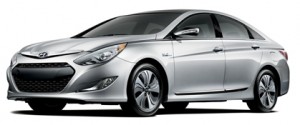The Sonata Hybrid has been on the move this year with improved fuel economy and design tweaks, but is it enough in the crowded segment to make a difference?
Hyundai hopes so, and has invested in a more powerful and lighter lithium polymer battery that boosts output by nearly 40 percent while taking up less trunk space.
The Korean company says polymer was chosen because its lifespan exceeds the industry 10 year/100,000 norm and, as such, offers an exclusive lifetime battery warranty.
Like other gasoline-powered sedans that have added a hybrid, the Sonata has been a success in its sixth generation in the U.S. after its debut overseas in 1985. It takes aim at the more efficient Ford Fusion and Toyota Camry hybrids.
Along with its 270-volt battery, the Sonata is equipped with a 2.4-liter, four-cylinder Atkinson cycle hybrid engine that together produce up to 199 horsepower to propel its six-speed automatic transmission.
The interior is roomy, nearly upscale and is available in a well-equipped trim level with lots of standard features you would likely pay extra for, including push-button start, Bluetooth technology, dual zone climate control and satellite radio.
Sonata hybrids are available as a Base model for around $25,000 and Limited for $30,000. The test car I drove for a week was the latter model, additionally equipped with a $1,000 panoramic sunroof that opens to the heavens for all five passenger seats.
For the extra dollars, the Limited adds leather seats, larger wheels, navigation, 7-inch touch screen, rearview camera and an upgraded Infinity audio package with nine speakers.
Seating is comfortable but could use some extra bolster support for front seats and seatbacks where padding is a little thin. The dashboard layout is modern with just the right amount of graphic gauges and easy access buttons to keep tabs on what’s going on inside the cabin and under the hood.
The Sonata hybrid is in its third year of production and engineers have been working on improving fuel efficiency measures each year. EPA tests show a combined 37 miles per gallon, with 36 and 40 miles per gallon in city and highway, respectively.
I found the Sonata does its best on the open road, cruising at legal speed along freeways. My pampered test kept the sedan at 65 miles per hour. Engine noise was minimal and, once up to speed, the car’s EV dash light monitor, detecting full electric drive, lit up more frequently, making me feel even greener than the illumination.
To be fair, there were a few passing maneuvers but no aggressive pedal movement along gently rolling landscape. Following 100 miles, a fill up showed highway fuel economy at 34 mpg.
Around town, with frequent stop and go driving, the Sonata automatically switched drive mode from electric to gasoline while moving from stop lights and through traffic.
The resulting lag in power at acceleration left me waiting in center lanes instead of turning left into oncoming traffic from a distance. The power switching back and forth from electric to gas resulted in a not so good city rating of 26 miles per gallon, although other drivers might achieve better results.
Overall, the Sonata offers a good value for the money and leads the industry with a lengthy warranty to protect consumers long after the sale.
| 2013 Hyundai Sonata Hybrid Limited |
| Engines: 2.4-liter, four cylinder hybrid engine, high power density motor, starter motor, polymer battery
EPA rated mileage: 36 city, 40 highway, 37 combined
Base price: $30,550
Model as tested: $32,490
Assembled: Asan, Korea. U.S. / Canadian parts content, 2 percent; major source of foreign parts content, Korea, 90 percent; country of origin, engine and transmission, Korea.
Crash test ratings: The National Highway Traffic Safety Administration (NHTSA) awarded the Sonata Hybrid a five-star overall rating (out of five), five-stars for overall side impact and four stars for frontal protection. The Insurance Institute for Highway Safety (IIHS) gave the Sonata Hybrid a ‘Good” rating, its highest, for frontal, side impact and rollover protection.
Warranty: 5 year/60,000 mile bumper to bumper; 10-year/100,000 mile powertrain; 10 year/100,000 mile hybrid system components; lifetime hybrid battery replacement. |







